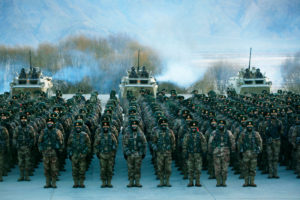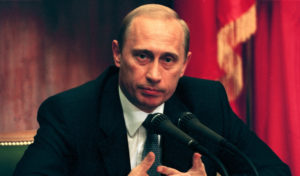Less than a year after 9/11, Dick Cheney had a message for Americans: the “old doctrines of security do not apply… Containment is not possible when dictators obtain weapons of mass destruction.”
Cheney was referring to Saddam Hussein, but it is not difficult to imagine the current President saying something similar about his Russian counterpart. Just last week, Joe Biden stated that Vladimir Putin was “not joking” about the use of nuclear weapons, warning that “we have not faced the prospect of Armageddon since Kennedy and the Cuban missile crisis”. Cheney’s hawkish worldview has been reinvigorated by Putin’s invasion of Ukraine. This time, however, those advocating restraint — the “realists” — are no longer just opponents, they are now enemies too.
In the past fortnight, the realists have been described as “intellectually bankrupt”, “pro-fascist” and “Putin apologists” — and that’s just in one article. It is a continuation of a trend that became prominent during the Covid era, in which it was no longer enough to question the argument, but to question the morality and the motives of the person making them too. Rather than being just wrong, proponents of realism — like the lockdown sceptics before them — are viewed as dangerous and morally flawed.
A diffuse network of intellectuals, think tanks, commentators, and politicians (on both the Left and Right), realists do not form any kind of cohesive bloc. All hew to a vague notion that America should act with restraint abroad, but have little else in common. There is neither a value system they wish to impart, nor a broad, all-encompassing ideology that holds them all together. This makes realism a modest doctrine; it doesn’t lend itself to extremism and Manichaean world-views.
Unlike idealists, who emphasise the importance of spreading democracy and human rights abroad, realists believe that countries are guided by self-interest, not abstract values. They eschew the Disneyfied view of the world of the kind recently expressed by President Biden, in which he characterised the escalating Ukrainian conflict as “a battle between democracy and autocracy, between liberty and repression, between a rules-based order and one governed by brute force”.
Such enthusiastic support for Ukraine is a natural symptom of the moral absolutism he displayed during the pandemic. It forgoes rational debate in favour of a moral impulse to be seen to be doing something, even if the costs of those actions are not fully considered. However noble the intention may be, the results are often tragic, as Afghanistan (cost: $2.313 trillion), Iraq ($2.4 trillion), Syria ($1.2 trillion) and Libya ($567 billion) attest. Likewise, the cost of pandemic mitigation is still being calculated, but it is becoming increasingly clear that the economic and social consequences were seriously underestimated.
Yet for all their policy failures, America’s idealist wing appears to have suffered few professional setbacks. Joe Biden’s foreign policy team isn’t all that different from Obama’s; Thomas Friedman, who once boasted in 2003 that “we could have hit Saudi Arabia…We could have hit Pakistan. We hit Iraq, because we could”, still lunches with the President.
Compare this to the almost immediate backlash realists faced after the Ukraine invasion. Until 24 February 2022, John Mearsheimer was a relatively anonymous IR professor at the University of Chicago who gave scholarly lectures on the clash between liberalism and nationalism in America. As one of the country’s foremost realists, he had been interested in the Ukraine question for some time, arguing that Nato enlargement was to blame for Russia’s antagonistic relations with the West. In 2015, he gave a lecture on the subject, which subsequently went viral after the invasion.
Mearsheimer turned into an overnight pariah. Weeks after the lecture was dredged up, students at his university signed an open letter explaining that they were “deeply pained” to learn that Mearsheimer was “propagating Putinism” and asserting that his actions were “extremely detrimental for our country”. They even demanded to know if he was on the Russian payroll. Meanwhile, other prominent realists such as Henry Kissinger and Noam Chomsky were roundly condemned for suggesting that Ukraine may have to cede territory to Russia in order to prevent further bloodshed. In Chomsky’s framing, Ukraine had to make concessions because Russia was like an incoming hurricane. “You may not like it, you may not like the fact that there’s a hurricane coming tomorrow, but you can’t stop it by saying, ‘I don’t like hurricanes’ or ‘I don’t recognise hurricanes’,” he said.
In response, Chomsky and “other like-minded intellectuals” were subjected to an open letter which accused them of “adding further fuel to the Russian war machine by spreading views very much akin to Russian propaganda”. Kissinger, who proposed the handover of Luhansk and Donetsk to Russia, was even admonished by Suella Braverman, who argued that the former diplomat was “appeasing” Russia. “People like Henry Kissinger believe that if we give the Russian dictator some of what he wants,” she wrote in June. “He’ll stop the war and we can return to normal.”
Such efforts to discredit the opinions of these academics bear a striking resemblance to the freighted criticisms thrown around during the Covid era. Following the publication of the Great Barrington Declaration, questions about the group’s funding were swiftly raised. In the same way that students believed that Mearsheimer was funded by Russia, the implication was that these scientists, Sunetra Gupta, Martin Kulldorff and Jay Battacharya, did not hold their views sincerely — they were merely a trojan horse for a wealthy libertarian think tank (Gupta even felt the need to profess her Left-wing credentials afterwards).
Implicit in all these charges was a conviction that these people were not just wrong, but on the wrong side of history too. Just as Conservative politicians who entertained lockdown scepticism were denounced for their “dangerous” beliefs, those who now outline a plan for peace in Ukraine — be it Elon Musk, the Pope, or Roger Waters — face a similar reaction. The lockdown sceptics were willing to sacrifice at-risk humans to save the economy; the realists were willing to let a country perish in service of great-power politics.
None of this is to suggest that realists have always been right. Predicting that Kyiv would fall in 72 hours, for instance, many underestimated the strength of the Ukrainian army and the incompetence of Russia’s. More recently, the claim by some realists that the US was behind the Nord Stream pipeline attack seems to have been disproved. And for every lockdown sceptic that slips into Covid denialism, there are realists who start off by asking legitimate questions about American military aid to Ukraine, and end by having to delete tweets that teeter on Holocaust revisionism.
On the bigger questions, however, each passing day adds succour to the realist argument. The fear of an escalation continues to grow, with politicians such as John Bolton calling for Putin to go and Tobias Ellwood MP claiming that strategic ambiguity is “no longer a deterrent”. Add to that former US National Security Council official Fiona Hill’s assertion that we are already living through a Third World War, and it’s easy to see why realists are urging caution.
Putin and Covid are both malevolent forces, but how we respond to them is — and should be — a contested subject. In the same way that our response to Covid benefitted from having lockdown sceptics in the tent rather than out, the same must apply to realists. They are, after all, raising important questions about Ukraine’s interests versus our own, and the degree to which it is escalating beyond our control. Absent that, America is almost certain to repeat the same foreign-policy errors as before. And when a nuclear power is in play, that adds an entirely new — and potentially catastrophic — dimension.
Disclaimer
Some of the posts we share are controversial and we do not necessarily agree with them in the whole extend. Sometimes we agree with the content or part of it but we do not agree with the narration or language. Nevertheless we find them somehow interesting, valuable and/or informative or we share them, because we strongly believe in freedom of speech, free press and journalism. We strongly encourage you to have a critical approach to all the content, do your own research and analysis to build your own opinion.
We would be glad to have your feedback.
Source: UnHerd Read the original article here: https://unherd.com/




